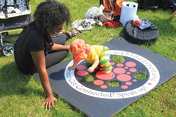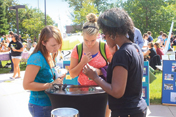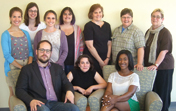Informing Consent: The Michigan BioTrust for Health
- Ann M. Mongoven
- Assistant Professor
- Center for Ethics and Humanities in the Life Sciences (CEHLS)
- College of Human Medicine
Ann Mongoven has been involved with the Michigan BioTrust for Health, an initiative that oversees the preservation of newborn blood samples and the development of policies for their use, since before its public rollout in 2009.
Newborn Screening In Michigan
The issue itself dates back to 1965, when Michigan law began requiring all newborn babies to be screened for serious medical conditions, such as phenylketonuria and sickle cell diseases, that require early treatment. A few drops of blood are taken from the baby's heel and put onto a paper card, which is then sent to the state public health lab for testing. Over the years, more than 4,000 babies with one of 50-plus conditions have been found and treated.
Because of the public health value of detecting treatable disease early, newborn screening is mandatory in Michigan. In the past, leftover blood samples were stored for several years in case they were ever needed by the family (e.g., to identify a missing child) or public health officials (e.g., to improve the newborn screening process). Medical researchers were also occasionally allowed to use de-identified samples.
Policy Shift as Genetic Research Capacity Evolves

Visitors check out exhibits at a Michigan BioTrust public education event.
Following an explosion of genetic research in the 1980s it became clear that the leftover samples were an invaluable asset for future research. Using the bloodspots for research is different from using them for medical testing, the original purpose for drawing blood. In 1999, a governor's policy commission on the uses of new genetic medical knowledge recommended that the samples be stored indefinitely, and for the first time began to address issues of donor privacy and consent to use the samples for research in the context of medical ethics as a whole.[1] The commission concluded it was acceptable to use the bloodspots for research without consent as long as identifying information was removed. The commission's report also recommended that the Governor provide a mechanism for ongoing expert advice and policy analysis as the field of genetics evolves.
The Michigan BioTrust for Health
In 2000 the Michigan legislature passed a law allowing the samples to be used for research. As the importance of genetic research continued to escalate, several years of policy debate followed. In 2009, state policy moved from allowing to encouraging such research, with the establishment of the Michigan BioTrust for Health. The BioTrust is an initiative that oversees both the preservation of the samples and the development of policies for their use, with a mission of supporting health research for the public good.
Michigan BioTrust Partners
- Michigan Department of Community Health—Oversees the Newborn Screening Program and the Michigan BioTrust for Health
- Wayne State University— Maintains the storage facility at its Biobanking Center in TechTown
- Michigan Neonatal Biobank— Responsible for storage and management of the samples at the WSU facility
- Van Andel Institute of Grand Rapids—Provides the custom-designed database system for archiving about 4 million bloodspots
Public discourse changed between 1999 and 2009, when the BioTrust was founded. In the intervening time, a national survey determined that most parents felt it was ethically obligatory for the state to ask permission to keep their children's blood for research. In Minnesota and Texas, legal injunctions restricted such research after citizens' lawsuits successfully claimed that research on the bloodspots without consent was a privacy violation. Concerns for privacy centered on the unique nature of human DNA, which is found in the bloodspots, and on questions about what data could be linked to the bloodspots. In 2010, Michigan became the first state to develop an explicit consent process to ask parents for permission at birth. However, the state maintains an "opt-out" process for Michiganians born between 1984 and 2010. Few of the millions in that cohort realize the state has their de-identified blood and that it can be used for research.
Exploring Public Opinion and Improving Citizen Oversight
The University of Michigan and MSU have received federal grants to explore public opinion about the BioTrust, recommend administrative structures to guarantee citizen input and oversight, and develop tools for public education. In a previous grant, U-M developed a public outreach and research website, and also conducted town hall meetings with diverse community groups. In the current grant, from the NIH Eunice Shriver National Institute of Child Health and Development, U-M and MSU are working together. Sharon Kardia, director of U-M's Life Sciences and Society Program, is the principal investigator of the five-year (2011-2015), $3 million NIH grant. Mongoven, along with co-investigator Stephen Lovejoy, associate director of MSU Extension, directs the $1 million MSU subcontract of the grant.
U-M has focused on efficient engagements with high numbers of people, such as a Facebook campaign and a statewide tour of college campuses. MSU has focused on a "thick" form of engagement—citizen deliberative processes, with a smaller number of people but high time-and-briefing intensity. In the next stage of the grant U-M and MSU will collaborate to integrate some of the most successful features of each kind of engagement in mass education that includes an interactive, deliberative element.
The MSU Deliberative Processes

Visitors check out exhibits at a Michigan BioTrust public education event.
In 2008, as the BioTrust was undergoing development, Center for Ethics and Humanities in the Life Sciences colleagues Professor Leonard Fleck, Mongoven, and graduate student Sarah Marzec convened a citizen jury from mid-Michigan for a pilot exploration of ethical and policy issues surrounding it. The study was funded by MSU's Institute for Public Policy and Social Research. Most of the 20 jurors supported using the bank for research, but they had concerns about consent, privacy issues surrounding the de-identification process for samples, commercial development, and other issues. They recommended that a "community values board," with members nominated by community organizations, be appointed to ensure community input into policies governing goals and ethics of the BioTrust.
Michigan Department of Public Health (MDCH) heeded recommendations from the jurors and other sources, and established a Community Values Advisory Board (CVAB) for the BioTrust.
"Conducting community engagement in Michigan on the BioTrust presents a sort of Goldilocks problem—the challenge is to reach a large number of people without sacrificing the depth that is needed to communicate on such a complex issue. Dr. Mongoven has shown herself to be a leader demonstrating creativity and innovation in her partnership with MSU Extension. She contributes seemingly limitless intellectual energy to improve the quality of our work and to consider every facet of biobanking ethics."
Sharon Kardia, Director, Life Sciences and Society Program, University of Michigan
Then, during the fall of 2011, the MSU team used their NIH funding to scale up the deliberative process to a statewide level. Their goal was to ascertain the range of acceptable bioethical policies and areas of consensus/non-consensus, and come up with a set of recommendations for the CVAB and MDCH.
The team recruited 70 deliberators from seven regional groups. "MSU Extension was a key asset to the success of the project," Mongoven said. "Several of their educators have specialized training and experience in public policy deliberative processes and meeting facilitation. And they are embedded in every county in Michigan. They helped to recruit citizens in each region as well as to facilitate the 20-hour process. Claire Layman, MSU Extension state public policy education specialist, is drawing on the structural model of the deliberations to inform wider-ranging civic facilitation initiatives within Extension."
"We tried to inject diversity every way we could think of," said Mongoven. "We intentionally oversampled racial, ethnic, and social minorities. We recruited from different education levels, age groups, socioeconomic groups, occupations, political ideologies, and religious affiliations. And we included written, aural, and visual education tools for diverse learning styles." The jury took up questions of research, consent, privacy, and oversight. Officials from MDCH briefed the participants, as did other experts on science, law, and ethics of biobanking.
Findings and Recommendations of the Citizen Jurors
Most participants supported the use of the bloodspots for research, but their support was contingent on an expected good-faith effort by the state to address
some outstanding concerns. Their overriding recommendation was to increase public education so people know their options. As they repeated throughout the process, "You can't opt out unless you know you are in." Although participants agreed privacy was an important issue, they felt that state educational materials focused too exclusively on how the bloodspots were "de-identified" through a coding process. They also wanted to know more about data that would be linked to the bloodspots. Participants were interested both in good research outcomes and in protecting themselves from risk. They wanted to know more about what research the BioTrust supports now and what processes would insure it supports high benefit/low risk research in the future. And they wanted more "people like us" on the BioTrust's Community Values Advisory Board—people who were not nominated by health organizations that might be seen to have a vested interest in the BioTrust.
The participants' hopes, concerns, and recommendations were delivered to the CVAB in March 2012. Mongoven put together a summary of the jury's recommendations, and deliberators from four regions of the state participated in delivering the testimony. At the same time they submitted a list of immediately actionable items, mostly having to do with making information about the BioTrust and the CVAB more accessible to the public. MDCH has implemented the most important of these: creation of three new "community member" seats for the CVAB; the posting of lay—not only scientific—abstracts of supported research on the BioTrust website; and clarification of consent documents.
Developing Tools for Education
Mongoven is now developing educational materials for the general public to appear on the BioTrust's website, the U-M website, and other relevant educational sites. "We're piloting an educational tool," she said. "The state will host a link to it. People could use it, for example, at PTA meetings."

"The MSU team have made outstanding contributions to all dimensions of this project. We have developed a strong, collaborative working group and I have been very impressed with Ann's determination, intellectual curiosity and creativity. The students she has brought on from MSU at various stages of the project have also been key to the successes we have had up to now."
Daniel Thiel, Assistant Director, Life Sciences and Society Program, University of Michigan
The education program is important, said Mongoven, because "the majority of people don't know they (or their children) have blood in the bank. Consent and privacy are important, but they are not the only concerns. People want to know what research is being done, the moral issues about it, and how the research gets funded. The tool presents this broader picture."
Lessons Learned
Mongoven is pleased with progress on the BioTrust project to date. The real credit, she feels, goes to the deliberators: "Their conversations resulted in persuasive testimony to the State. It changed some of the terms of discourse, and some oversight processes. The State also deserves much credit—it both participated in the process and listened to the results. The BioTrust's advisory process and our own educational materials have both been improved based on those robust citizen conversations." Personally, the project has also given Mongoven an opportunity to "rethink what ‘informed consent' means in the context of biobanking" and to publish an article on the topic.
She is also pleased with the quality of student involvement in the program. "Seven graduate students and three undergrads have worked on the project. We simply could not have done it without them." The graduate students worked as co-facilitators of the deliberations and as research assistants. A creative undergraduate designed visuals for the educational tool. Three students are part of the team for the next phase of the project.
Future Directions
"The potential reach of the bank keeps expanding," said Mongoven. "It gets more important as time goes on. It's important to address the issues proactively before they come at us."
"Michigan has an opportunity to be a pioneer in this area," she added. 'Twenty states have banks but Michigan is progressive in two ways. One, we're the first state to create an opt-in process (asking for permission to use new samples). Two, the trust's oversight includes a functioning Community Values Advisory Board—and that's a big accomplishment."
- Written by Linda Chapel Jackson, University Outreach and Engagement
Sources
- Michigan Commission on Genetic Privacy and Progress. (1999, February). Final report and recommendations. Lansing: Michigan Department of Community Health. Retrieved from michigan.gov/documents/GeneticsReport_11649_7.pdf